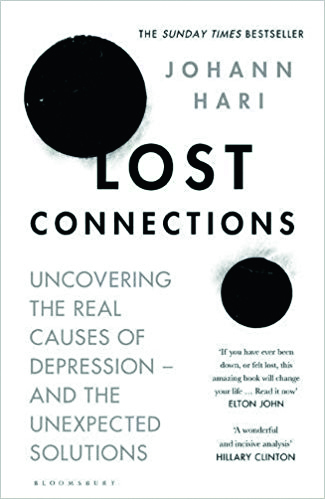
A teenage Johann Hari is prescribed paroxetine, an antidepressant, for the first time. Your depression, he is told by his GP, is a result of ‘a chemical imbalance in the brain’ caused by ‘depleted levels of a chemical named serotonin’. Hari places the pill in his mouth. As the ‘chemical kiss’ caresses his tongue and sinks to his stomach, Hari experiences:
‘… a light thrumming I was sure consisted of my brain synapses groaning and creaking into the correct configuration … I could do anything … with my new chemical armor. I wasn’t afraid.’
As the years went by, however, ‘no matter how high a dose I jacked up my antidepressants to, the sadness would always outrun it’. As his dosage increased from 20 mg to 60 mg over a period of a few years, Hari began to question the narrative he had been repeatedly told, that chemical antidepressants can defeat depression alone.
Undergoing a ‘40 000-mile journey across the world’ in order to meet and conduct interviews with over 200 individuals, Hari collected the views of those battling depression — social scientists, psychiatrists, and medical experts in the fields of depression and anxiety — in order to outline ‘nine proven causes of depression and anxiety’, and offer ‘seven social [and] psychological alternatives’ to use with chemical antidepressants.
Part memoir, part scientific and cultural study, Lost Connections is a deconstruction and examination of the narrative that has been told to millions — that antidepressants alone can cure depression. Hari argues that only in combination with tackling social and economic influences can depression be beaten with chemical support, and the evidence this book provides is impossible to ignore.
Though the uncomfortable facts, figures, and statistics relating to the mass-manufacturing and promotion of antidepressants provide fresh and disturbing insights into the individualistic, mass-consumerist nature of our capitalist society, Lost Connections is further strengthened as a result of Hari’s seemingly effortless ability to weave stories. When Hari reports a meeting with an interviewee, for example, we are transported to the present tense. As a result, interviews are given new life by his narrative voice, and the scenes Hari creates can often conjure new and powerful images of their own. The result is a perfect balance of fictionalised non-fiction and factual evidence, coupling diverse personal narratives with an intense investigation into the failings of Western society to better connect us all.
Reflecting on Lost Connections, I strongly believe that what Hari has created may be one of the most important texts of recent years. The book gives a voice to those who cannot speak and hands them a megaphone to vibrate the monolithic towers of the antidepressant drug industries. It teaches that through community, through social and natural connection, and through understanding, depression can be tackled via alternative means.


